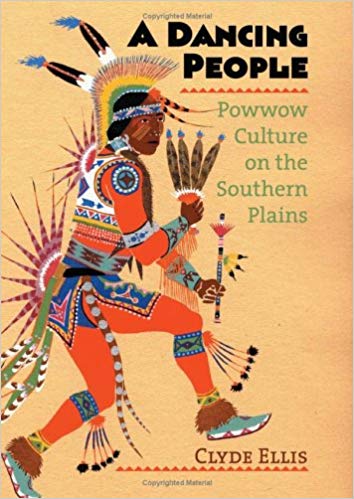Background
Clyde Ellis was born on March 29, 1958, in Greenville, North Carolina, United States, to James B. Ellis, a professor of journalism, and Gwen (Richardson) Ellis, a social service worker.

2017
Clyde Ellis and two elders from the Kiowa Nation — Jim Anquoe, left, and Parker Emhoolah, who sang an honor song for Ellis during his induction into the Oklahoma Historians Hall of Fame
1400 Spring Garden St, Greensboro, NC 27412, United States
University of North Carolina
625 7th Ave NE, Hickory, NC 28601, United States
Lenoir–Rhyne University
Stillwater, Oklahoma, United States
Oklahoma State University
1100 E 14th St, Ada, OK 74820, United States
East Central University (logotype)
50 Campus Drive, Elon, NC 27244, United States
Elon University
Hanover, New Hampshire, United States
Dartmouth College
Organization of American Historians (logotype)









(Between 1893 and 1920 the U.S. government attempted to tr...)
Between 1893 and 1920 the U.S. government attempted to transform Kiowa children by immersing them in the forced assimilation program that lay at the heart of that era's Indian policy. Committed to civilizing Indians according to Anglo-American standards of conduct, the Indian Service effected the government's vision of a new Indian race that would be white in every way except skin color. Reservation boarding schools represented an especially important component in that assimilationist campaign. The Rainy Mountain School, on the Kiowa-Comanche-Apache Reservation in western Oklahoma, provides an example of how theory and reality collided in a remote corner of the American West. Rainy Mountain's history reveals much about the form and function of the Indian policy and its consequences for the Kiowa children who attended the school. In To Change Them Forever Clyde Ellis combines a survey of changing government policy with a discussion of response and accommodation by the Kiowa people. Unwilling to surrender their identity, Kiowas nonetheless accepted the adaptations required by the schools and survived the attempt to change them into something they did not wish to become. Rainy Mountain became a focal point for Kiowa society.
https://www.amazon.com/gp/product/0806128259/?tag=2022091-20
1996

(This volume is a comprehensive history of of Southern Pla...)
This volume is a comprehensive history of of Southern Plains powwow culture - an interdisciplinary, highly collaborative ethnography based on more than two decades of participiation in powwows - addressing how the powwow has changed over time.
https://www.amazon.com/gp/product/0700612742/?tag=2022091-20
2003
Clyde Ellis was born on March 29, 1958, in Greenville, North Carolina, United States, to James B. Ellis, a professor of journalism, and Gwen (Richardson) Ellis, a social service worker.
Ellis became a Bachelor of Arts at the Lenoir-Rhyne College (now Lenoir–Rhyne University) in 1980. In 1986 he received his master's degree from the University of North Carolina at Greensboro. And finally, in 1993, he obtained doctor's degree from the Oklahoma State University.
Professor Ellis served as a lecturer in history at the University of North Carolina at Greensboro for 4 years from 1989, also holding a position of a faculty fellow from 1990 to 1991. At the Oklahoma State University, he was an instructor in American history in 1988. Ellis worked at the post of an assistant professor of history at the East Central Oklahoma State University just for a year from 1993. Next year he moved to the Elon College, taking the position of an adjunct assistant professor, changing it to an assistant professor of history in 1995. Simultaneously, from 1994 till 1995, Ellis worked as a lecturer at the University of North Carolina. He held the same position at the Oklahoma Foundation for the Humanities in 1997.
The past 25 years Clyde Ellis had spent living and working on the Southern Plains in the Kiowa community of southwest Oklahoma conducting extensive fieldwork on boarding schools Christian missions, Native hymn traditions, and powwow culture.
Ellis worked as the Gordon Russell Endowed Visiting Professor of Native American Studies at Dartmouth College in 2002. During 2007-2010 he served the Organization of American Historians as a Distinguished Lecturer, and in the summer of 2011, he was selected as a National Endowment in the Humanities summer scholar.
Ellis is a consultant on American Indian education. Recently he has developed his research, including southeast North Carolina's Indian communities to it, and has published a series of significant studies on that region's powwow culture.
Ellis is a contributor of articles and reviews to history journals and other magazines, including the Historian, the Chronicles of Oklahoma, and the VISaVIS. Later he worked as a book review editor of the American Indian Quarterly, and as a member of editorial board of the American Indian Culture and Research Journal.
Clyde Ellis was inducted into Oklahoma Historians Hall of Fame on April 28 in a ceremony at the annual meeting of the Oklahoma Historical Society in Catoosa, Oklahoma. Ellis's induction included the presence of a large delegation of Native people, including two elders from the Kiowa Nation who sang an honor song for him.
Ellis has also been a grant reviewer for the Guggenheim Fellowships, the National Endowment for the Humanities, the Social Science and Humanities Research Council of Canada and the National Science Foundation.
At Elon he has been awarded the Distinguished Scholar Award from both the College of Arts & Sciences and the university.
(This volume is a comprehensive history of of Southern Pla...)
2003(Between 1893 and 1920 the U.S. government attempted to tr...)
1996Although Ellis trained as a historian, he is interested in culture and how it’s constructed as he is in the often narrowly construed contours of historical narrative. Since his first visit to Oklahoma in 1977, Ellis has grown increasingly interested in contemporary Southern Plains ethnography. Because he has been lucky enough to spend a good deal of time with Indian people, he has come to realize that scholarship that doesn’t include their voices—indeed, which doesn’t give their voices primacy—is increasingly moribund, if not irrelevant.
Ellis is a member of the Western History Association and the Oklahoma Historical Society.
Ellis married a woman named Mary on December 29, 1990.
